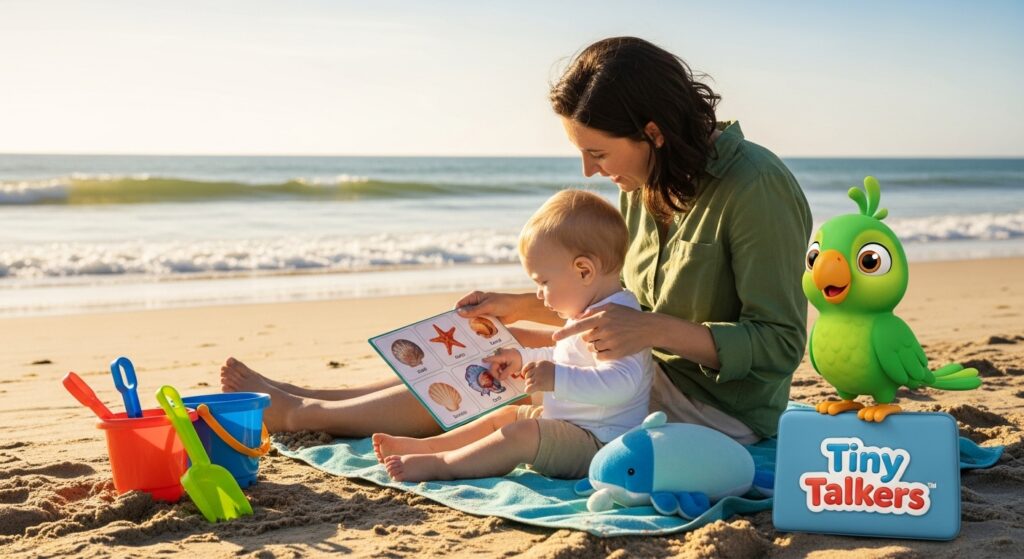Expanding a toddler’s vocabulary is an exciting journey that intertwines with everyday life. As a parent, you hold the key to unlocking a world of words simply by using the objects around you. With patience, creativity, and a bit of guidance, everyday items can transform into powerful learning tools. Let’s explore the ways you can enrich your child’s language skills using items you already have at home.
The Importance of Vocabulary Development
Language development is crucial in the early years as it lays the foundation for future communication skills, reading, and writing. A rich vocabulary not only helps toddlers express their needs and emotions but also enhances their ability to understand the world around them. By integrating vocabulary-building activities into daily routines, you create a language-rich environment that nurtures your child’s growth.
Everyday Objects as Vocabulary Tools
1. Kitchen Adventures
The kitchen is a treasure trove of learning opportunities. As you prepare meals, engage your toddler by naming ingredients, utensils, and appliances. Describe their colors, shapes, and textures. For example, while baking, you might say, “These eggs are oval and smooth. Let’s crack them into the bowl.”
- Introduce New Words: Use specific names like “colander” instead of “strainer” or “whisk” instead of “mixer” to expand their vocabulary.
- Sensory Exploration: Allow your child to touch, smell, and taste different ingredients, reinforcing new words through sensory experiences.
2. Laundry Language
Transforming chore time into learning time can be both productive and educational. As you sort clothes, involve your toddler by discussing the different clothing items and their properties.
- Descriptive Language: Use adjectives to describe textures and colors, e.g., “This wool sweater is soft and warm.”
- Sorting and Categorizing: Encourage your child to sort clothes by type or color, introducing words like “sock,” “t-shirt,” “pants,” and their corresponding colors.
3. Bath Time Vocabulary
Bath time is more than just a daily routine; it’s a perfect opportunity for language enrichment. As your toddler splashes and plays, introduce new vocabulary related to water, body parts, and bath toys.
- Action Words: Use verbs like “splash,” “pour,” and “float” to describe what your child is doing.
- Body Parts: Reinforce words like “arm,” “leg,” “belly,” and “chin” while washing.
4. Toy Talk
Toys are a natural medium for language development. During playtime, engage your child in conversations about their toys, encouraging them to express their thoughts and ideas.
- Narrative Skills: Create stories with their toys, asking questions like, “Where is the teddy going?” or “What is the doll doing?”
- Descriptive Play: Use descriptive language to talk about the toys’ features, such as “The blue train is going fast.”
Everyday Outings as Learning Experiences
1. Nature Walks
Taking a walk outside opens up a world of vocabulary opportunities. Whether you’re in a park or just strolling around the neighborhood, nature provides countless objects to discuss.
- Nature Vocabulary: Point out and name plants, animals, and natural phenomena. Use specific terms like “oak tree,” “sparrow,” and “rain puddle.”
- Seasonal Words: Discuss changes in the environment with words associated with different seasons, like “bloom,” “wilt,” “snow,” and “sunshine.”
2. Shopping Trips
Grocery stores are bustling with items that can pique a child’s curiosity. While shopping, involve your toddler by discussing different foods and products.
- Food Names: Introduce new vocabulary by naming fruits, vegetables, and packaged goods.
- Conversation Skills: Encourage your child to ask questions about the items, fostering dialogue and curiosity.
Techniques for Effective Vocabulary Expansion
1. Repetition and Consistency
Consistency is key when it comes to language learning. Repeated exposure to new words helps toddlers understand and remember them.
- Daily Practice: Integrate new vocabulary into daily conversations naturally and frequently.
- Reading Together: Books are a fantastic resource for introducing new words and concepts. Choose picture books that feature everyday objects and activities.
2. Encouraging Expression
Active participation in conversations enhances vocabulary retention. Encourage your toddler to use new words by asking open-ended questions.
- Interactive Dialogue: Prompt your child to describe what they see or do, providing gentle corrections and expansions on their responses.
- Positive Reinforcement: Celebrate efforts and achievements with praise, reinforcing their desire to learn more.
3. Visual and Auditory Aids
Visual and auditory tools can support vocabulary learning by providing different contexts and stimuli.
- Flashcards and Picture Books: Use flashcards with images of everyday objects or read picture books that illustrate daily life.
- Songs and Rhymes: Incorporate songs and nursery rhymes that highlight everyday objects and activities, making learning fun and memorable.
Conclusion
The journey to expanding your toddler’s vocabulary is a rewarding experience, filled with opportunities to connect and grow together. By using everyday objects as learning tools, you create a dynamic and engaging environment that nurtures language development. Remember, your enthusiasm and encouragement play a crucial role in fostering your child’s love for words. Embrace the process with patience and joy, knowing that each word learned is a step forward in their lifelong journey of learning and communication.

